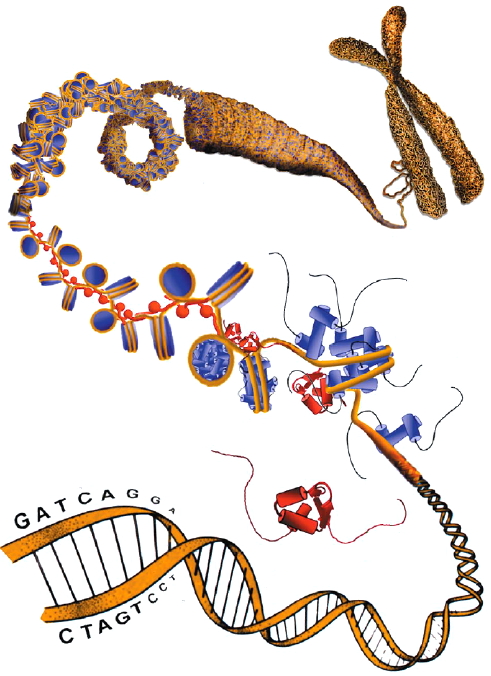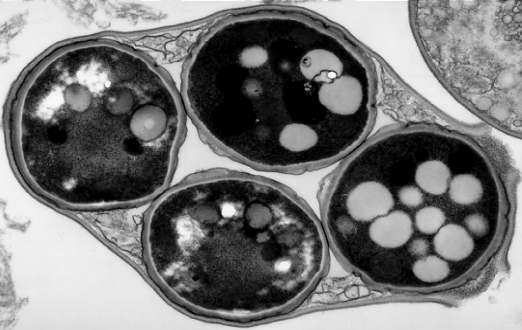 Epigenetics and cell differentiation
Epigenetics and cell differentiation

 Each of the cells in our body contains the same genetic information, passed down since fusion of the maternal and paternal gametes took place. However, each cell is capable of differentiating to form the different cell types, including neurons, lymphocytes and muscle cells, which make up the multitude of tissues in the human body. We study the mechanisms, known as epigenetics, responsible for this cellular flexibility. Epigenetic information is present in the cell's nucleus, organising the DNA as chromatin. It regulates gene expression during all the major events in life (embryonic development, cell proliferation and differentiation).
Each of the cells in our body contains the same genetic information, passed down since fusion of the maternal and paternal gametes took place. However, each cell is capable of differentiating to form the different cell types, including neurons, lymphocytes and muscle cells, which make up the multitude of tissues in the human body. We study the mechanisms, known as epigenetics, responsible for this cellular flexibility. Epigenetic information is present in the cell's nucleus, organising the DNA as chromatin. It regulates gene expression during all the major events in life (embryonic development, cell proliferation and differentiation).
We are particularly interested in gamete formation, particularly male gametes. Each sperm cell transmits not only the father's genes, but also a very specific epigenome. Indeed, the sperm nucleus is reorganised to make it very compact. This involves a complete reprogramming step. During this reorganisation, the main protein components of chromatin, histones, are replaced by protamines, placement of which is a key element in determining fertility.
For almost 10 years, we have been involved in research projects characterising various aspects of chromatin dynamics during gametogenesis.
Through these projects we investigated the final steps in reorganisation of the sperm nucleus using a unique combination of proteomics and functional assays. These projects were possible thanks to a close collaboration with Saadi Khochbin's research group (Web site).
The EpiGam research project currently ongoing at EDyP is a follow-up to previous studies. An innovative research model, yeast spores, is being used to reveal new aspects of the chromatin dynamics of gametes.
Selection of publications:
Govin J, Gaucher J, Ferro M, Debernardi A, Garin J, Khochbin S and Rousseaux S
Proteomic strategy for the identification of critical actors in reorganisation of the post-meiotic male genome.
Molecular Human Reproduction, 2012, 18(1): 1-13
Govin J, Escoffier E, Rousseaux S, Kuhn L, Ferro M, Thévenon J, Catena R, Davidson I, Garin J, Khochbin S and Caron C
Pericentric heterochromatin reprogramming by new histone variants during mouse spermiogenesis.
Journal of Cell Biology, 2007, 176(3): 283-294
Govin J, Caron C, Escoffier E, Ferro M, Kuhn L, Rousseaux S, Eddy EM, Garin J and Khochbin S
Post-meiotic shifts in HSPA2/HSP70.2 chaperone activity during mouse spermatogenesis.
Journal of Biological Chemistry, 2006, 281(49): 37888-37892
 Epigenetics and chromatin dynamics in gametes: "yeast spore" model and proteomics (
Epigenetics and chromatin dynamics in gametes: "yeast spore" model and proteomics (EPIGAM)
  Coordinator and leader at the EDyP team Coordinator and leader at the EDyP team:
Jérôme Govin
Funding:
ANR, Action Marie Curie (FP7) and Université Joseph Fourier de Grenoble. |
The field of epigenetics and chromatin dynamics developed exponentially over the last decade, revealing numerous molecular mechanisms. However, some aspects of chromatin organisation remain obscure. In particular, chromatin organisation in gametes remains poorly understood, as does it role during fertilisation and early embryonic development. A better understanding of chromatin organisation would contribute to the fields of medically assisted procreation, cancer biology and regenerative medicine.
We are developing an ambitious and innovative research programme, aiming to decipher epigenetic organisation and chromatin dynamics during differentiation of male gametes. Using a simple cellular model, yeast spores, which effectively mimes the chromatin dynamics of mammalian gametes, our project combines multidimensional approaches in genetics, biochemistry and proteomics. EPIGAM will have favoured access to the unique proteomics resources available at EDyP. In addition, this programme promotes the development and wider use of new proteomics methods, in particular in quantitative proteomics.
Publications :
Govin J, Gaucher J, Ferro M, Debernardi A, Garin J, Khochbin S and Rousseaux S
Proteomic strategy for the identification of critical actors in reorganisation of the post-meiotic male genome.
Molecular Human Reproduction, 2012,
18(1): 1-13
Govin J, Escoffier E, Rousseaux S, Kuhn L, Ferro M, Thévenon J, Catena R, Davidson I, Garin J, Khochbin S and Caron C
Pericentric heterochromatin reprogramming by new histone variants during mouse spermiogenesis.
Journal of Cell Biology, 2007,
176(3): 283-294
Govin J, Caron C, Escoffier E, Ferro M, Kuhn L, Rousseaux S, Eddy EM, Garin J and Khochbin S
Post-meiotic shifts in HSPA2/HSP70.2 chaperone activity during mouse spermatogenesis.
Journal of Biological Chemistry, 2006,
281(49): 37888-37892